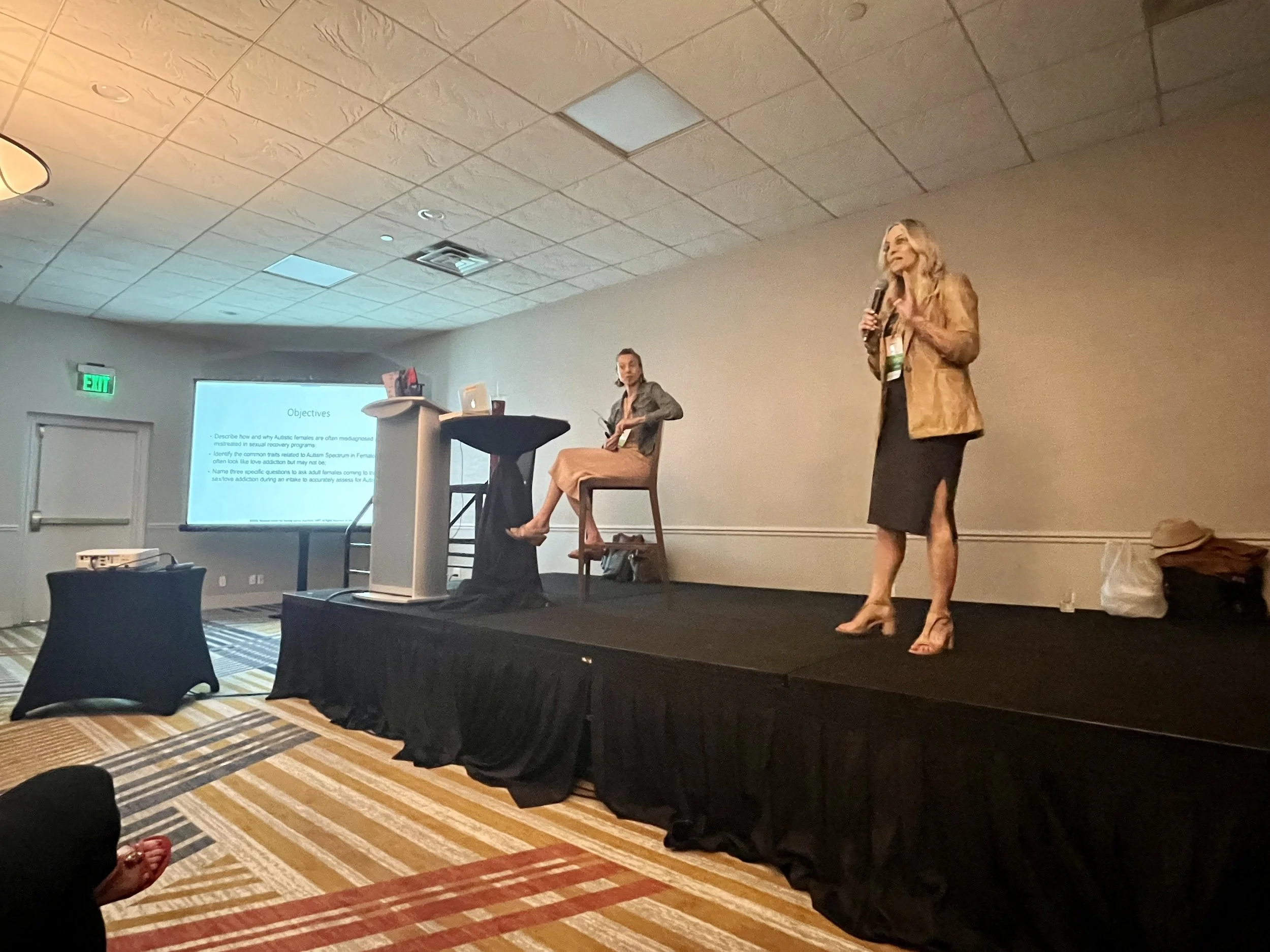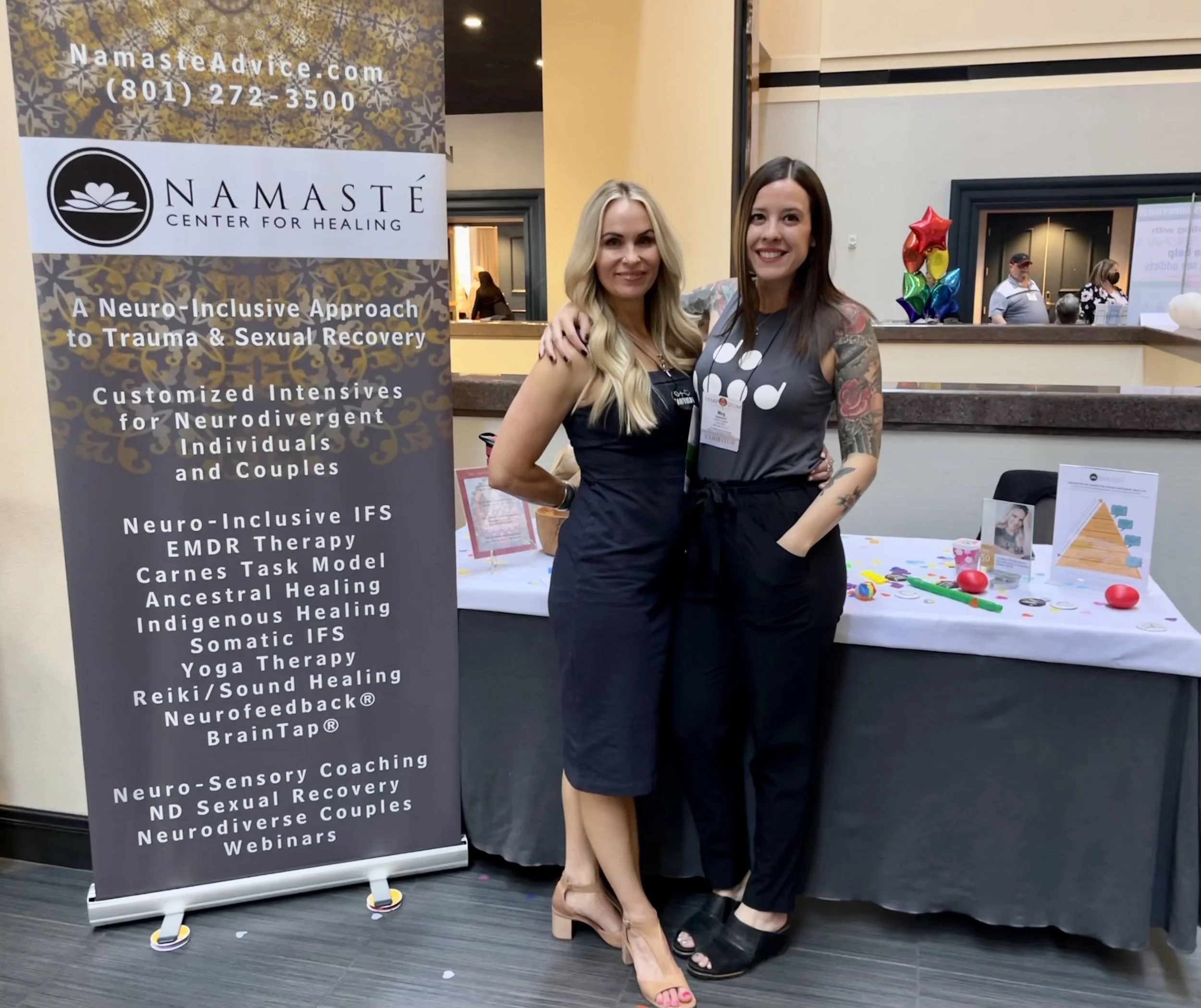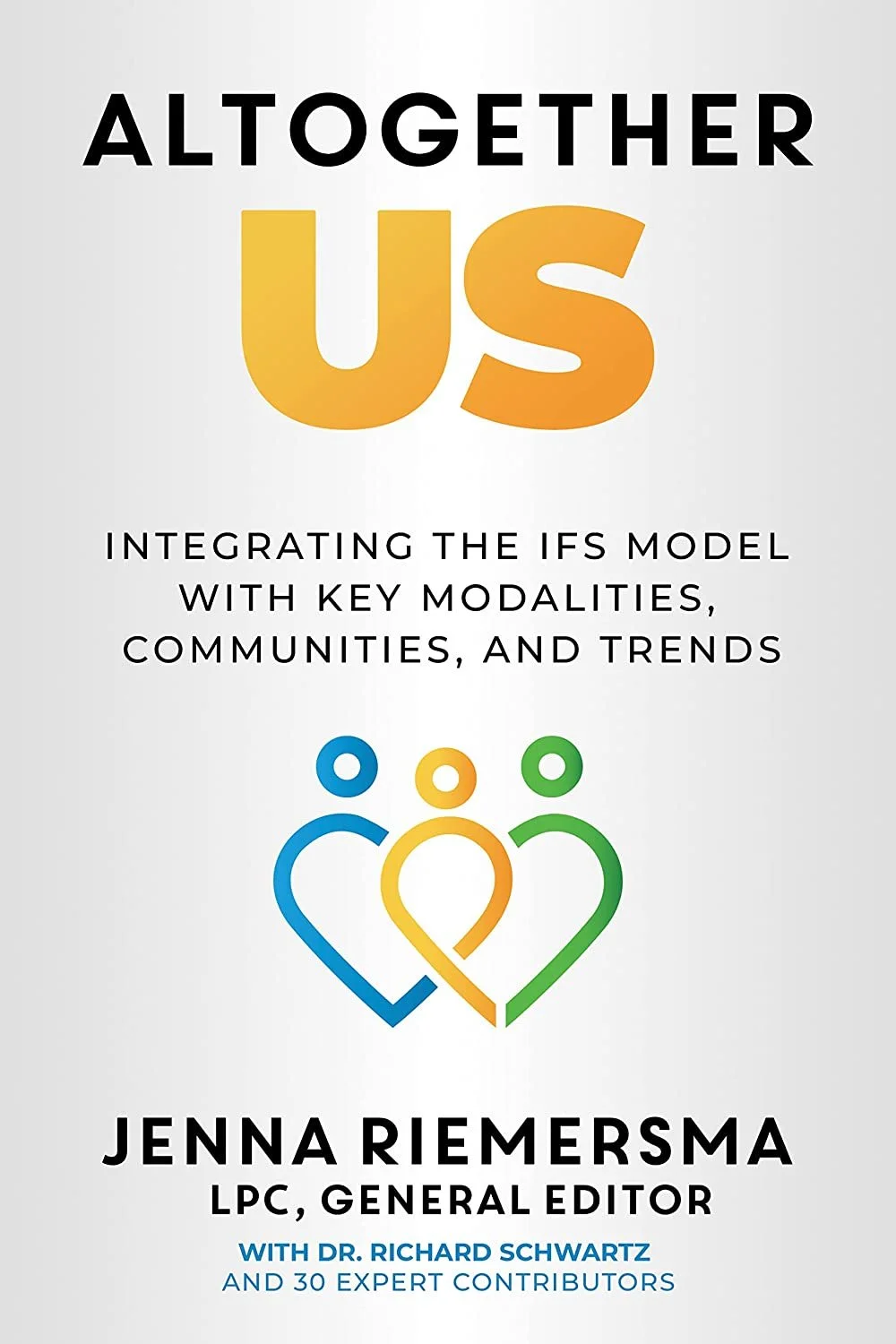If you are an Autism Specialist, Contact Candice@NamasteAdvice.com for FREE Autism Screening Tool.
I co-presented with my Autistic colleague Aly Dearborn, LMFT at the April 2023 International Institute of Trauma & Addiction Professionals Annual Symposium on “Loved Addicted or Autistic & Seeking Safety? Accurately Screening, Assessing, and Treating Autistic Females Presenting with Symptoms of Trauma, Sex, and Love Addiction to Inpatient and Outpatient Settings.” Our presentation addressed the importance of screening for Autism in adult women who often present in treatment with chronic mental health challenges and intimacy/relationship difficulties.
Together, Aly and I developed a neuro-affirmative screening tool for clinicians and medical providers to help inform them about the Autistic presentation and reframe Autism as a neurotype, not a disorder, with a focus on exploring a person’s “Autistic ways of being” from an empowered space.
Interested in Candice’s FREE Autism and Sensory Sex Book in PDF form?
Email Candice@NamasteAdvice.com
are you INTERESTED IN doing INDIVIDUAL and/or IFIO COUPLE THERAPY with us and learning about neuro-inclusive ifs, IFIO?
CONTACT US!
What is Neuro-Inclusive IFS?
Meg Martinez, LCMHC and I, Candice Christiansen, LCMHC have developed a Neuro-Inclusive Approach to IFS. This was inspired by my and other Autistic, ADD, ADHD (and similar neurotypes) adults continued experiences with well-meaning IFS therapists who were causing unintentional harm to Neuro-different clients based on assumptions, implicit and explicit biases, and their own legacy burdens. Both Meg and I LOVE the IFS model and are dedicated to ensuring that clients seeking healing from trauma and a variety of sexual and relationship issues feel supported in the way that our brains and Autonomic Nervous Systems (ANS) need.
A Neuro-Inclusive Approach to IFS offers four goals for therapists who work with Neurodifferent individuals by inviting therapists to: 1) Use curiosity with Neurodifferent clients around their sensory, learning, and internal system needs; 2) Access Self energy to navigate a client’s need for safety if microaggressions occur; 3) Explore therapist’s individual, legacy, and cultural burdens related to implicit bias, judgment, and stereotypes against Neurodifferent individuals; 4) Creatively implement IFS mapping exercises with Neurodifferent clients to flesh out Neurodifferent traits vs. client parts.
Our chapter on our Neuro-Inclusive Approach to IFS can be found in the book Altogether US, here.
Some Neuro-Inclusive Concepts we teach at Namasté….
(in order of pictures, top left to right, bottom left to right)
We view Autism as a Neuroculture; there are differences in how an Autistic person, perceives, understands, behaviors and communicates in the world. This is different, not deficient. For couples, if both can remain curious and open to understanding each person’s neurotype, growth as a couple is possible.
The Autism Triad-Candice developed this to help individuals and couples understand how impactful Sensory Responsivity and feeling the Emotions and Energy of other people impact an Autistic person’s ability to connect and communicate relationally.
Curating a Neuro-Affirmative KAP “Set and Setting” for Autistic Adults; creating a sensory soothing setting, as well as emotional safety is crucial for an Autistic, ADHD or similar neurotype adult to be able to be able to enjoy their Ketamine Journey.
The Hierarchy of Needs for Autistic, ADHD Adults in sexual recovery: Candice created this visual aid for professionals as well as clients to use as a guide for understanding what is needed for Neuro-inclusive sexual recovery.
The 7 Types of Communicators in Same/Mixed Neurotype Relationships: Candice created this handout for couples to understand the 7 types of ways that non-Autistic and Autistic adults communicate. Sometimes both in a coupleship can have multiple ways of communicating. Candice uses this as a guide with Autistic couples to understand the other person’s way of communicating and how to communicate better together.
An Example of Emotional Contagion: Autistic individuals are often incredibly sensitive to the energy and emotions of other people. This can create confusion for an Autistic person who may not be able to decipher what emotions are theirs verses the other person. This can create dysregulation and confusion, as well as impact and Autistic person’s ability to communicate and connect non-sexually and sexually.
podcast interviews with Candice
—> LISTEN/WATCH CANDICE ON SEX, ADDICTION, AND RELATIONSHIPS
CANDICE TALKS TO DAN DRAKE, TIM STEIN, WENDY, CONQUEST, AND JEANNE VETTUONE ABOUT AUTISM-WHAT IT IS AND ISN’T, RELATIONSHIPS AND MORE!
—> Listen to Candice on ‘Neurodiversity Gold’ podcast
CANDICE TALKS TO JUDE MORROW ABOUT SEX AND INTIMACY
—> Listen to Candice & Chris on ‘LIVING UNSCRIPTED PODCAST’
A RAW CONVERSATION ABOUT OUR NEURODIVERSE RELATIONSHIP UPS/DOWNS & MICROPLEASURES
—> Listen to Candice & Chris on ‘Love Deep Lab’
INTIMACY & SEX FOR NEURODIVERSE COUPLES
—> Listen to Candice on ‘Blog talk Radio’
AUTISM AND INTIMACY DISORDERS WITH CAROL THE COACH
—> Listen to Candice on ‘A Brave New Man’:
—>LISTEN TO CANDICE WITH DR. ROB ON ‘SEXANDRELATIOSNHIPRECOVERY.COM’:
What is “Neurodivergence”?
First, we ALL have neurodiverse brains. If a group of Autistic, ADHD individuals are in a room with those considered “Neurotypical” individuals (individuals with “typical” brains) this would be considered a neurodiverse group of people-a group that has variation in brain types. Likewise, Neurodiversity, a term developed by Judy Singer in 1998, is the idea that it's normal and acceptable for people to have brains that function differently from one another. The idea that only Autistic or ADHD individuals have neurodiverse brains is a myth. Individuals who have neurologically different brains via neurodevelopmental differences and diagnoses that are considered “mental illness” are also considered a type of Neurodivergence. Examples: Autism, ADHD, dyslexia, Tourettes’, dyspraxia, synesthesia, dyscalculia, down syndrome, epilepsy, schizophrenia, bipolar disorder, obsessive-compulsive disorder, chronic anxiety, and chronic depression.
Who am I?
I am Candice Christiansen (she/her, they/them pronouns) and I am the Founder of Namasté Center For Healing. I am Autistic, ADHD, have social and general anxiety, and dyspraxia. I am German, English, Scottish, Dutch married to Chris who is Lakota, Hawaiian, and Japanese. I was diagnosed as being socially anxious/general anxiety in my teens, misdiagnosed as borderline personality disorder, dependent personality disorder for decades by mental health and medical professionals who were not properly trained to look for Autism and ADHD in females. One therapist told me I wasn’t Autistic and she knew that because years ago she evaluated Autistic boys…(Huh?!).
I was finally accurately diagnosed as Autistic nearly 5 years ago. As of 2022, I am self diagnosed ADHD. I do not believe my genetic brain differences are caused by trauma-this, in my opinion is a reductionist approach that doesn’t take into consideration the wealth of research that describes the complex and heterogeneous array of developmental, genomic, neurobiological, and cognitive differences of neurodifferences. However, I do believe that trauma is a significant part of many Neurodifferent individuals’ lived experiences among a neuromajoriy that is not neuro-inclusive or neuro-sensitive.
Coming out as Neurodifferent and exploring how they show up in my life has been a fascinating experience, but also a life safer, at times frustrating when the neuro-majority judges or shames me for being me. However, overall I continue to learn about myself and am connecting with other neurodifferent individuals globally who have been a huge support to me on my journey. I aim here to inspire you, advocate for you and support you in your neurodifferent journey as well! We all deserve to be seen, so #ISEEYOU, #IVALIDATEYOU, #IACCEPTYOU.
I am here to support you in understanding your Neurodifferent brain.
All parts (“software”) of you are welcome here and your “hardware”-brain differences-are welcome here too!
Neurodivergence is misunderstood… My Story
Neurodivergence or as I call it, Neurodifference is a misunderstood term, especially when it comes to Autistic adults. Why? Because we learn to MASK our symptoms-this means we learn to hide who we are authentically thinking we will fit in better if we do. It is exhausting, trust me!
As an Autistic woman, I am very well-spoken (a mask I have worn)-trust me, I had great teachers! As a result, I was misdiagnosed for over 2 decades by well-intentioned therapists who had a belief that one symptom could determine Autism. Because I learned to hide (mask) my autistic traits as a youth, I learned to give eye contact and pretend like I was more “social” even though both make me want to rip my hair out due to the emotional and physical discomfort I experience. Loved ones didn’t see my struggle with hygiene-everyone just assumed I knew how to brush my teeth, etc. as a kid-no need to teach me (?!), and my “rigidity” when there is change-that is autonomic nervous system dysregulation from environmental stress- or my anxious “melt downs”-which are due to external stressors in the environment, not because “I am Autistic.” I have been labeled, judged, pushed into boxes of diagnoses, and dismissed, ignored, and rejected because I am Autistic. Sure I struggle to understand sarcasm and jokes but I didn’t deserve to be the recipient of bullying or all the teasing from my family for being “too sensitive.” My somatic and affective empathy towards others is a gift and quite common among Autistic/ADHD humans-although non-neurodifferent humans won’t admit that because they typically recognize empathy as only being cognitive or responsive empathy.
I loved to play as a child with my siblings. I loved playing pretend and make believe. At times I was aggressive with them and took things personally (now I know my sensitivity to rejection is a real thing-RSD-Rejection Sensitive Dysphoria). I was always super sensitive to the energy in the environment, peoples feelings and was always afraid of being rejected or judged. I loved stacking my barbies and stuffed animals in a row as a child. This was how I played. I was viewed as having my silly “obsession” with girl toys-which when I looked back I think “who cared?” But that is now viewed by society as “abnormal” via play-(but really, is there a way to play that IS “normal”?)
I do well if I have one or two friends and if I have freedom to choose my relationships; but society judges this as me struggling to form or maintain friendships. Instead of being noticed for having a brilliant autistic mind that helped me create my successful programs, websites, curriculum, workbook, etc., I have been juddged by colleagues as being “handed things on a silver platter” or being “too pretty” —whatever any of this means. No one knew for years the inner pain and confusion I experienced at feeling like a major misfit; socially uncomfortable in my own existence for being me. Sadly, the average person or professional who cannot identify the unique forms of autistic expression misunderstands so many of us who have become excellent at masking our autistic traits. Along with this, many people assume that if a person is autistic, we must be asexual and lack empathy.
Many neurodifferent adults enjoy connection, contact, communication!
Most of us who are Autistic, ADHD, or other ND enjoy our relationships, connection, and intimacy (non-sexual and sexual). Some neurodifferent adults admit to me that they struggle with impulsivity and risky sexual behavior (due to low levels of dopamine) which can be challenging for their relationships. Some enjoy and find comfort in the furry fandom communities, Therianthropy. While others may engage in behaviors that end up being compulsive and harmful to their bodies, minds, and relationships: Excessively viewing porn and/or playing video games, bingeing on food. Still other neurodivergent adults may unintentionally and unknowingly break the law by connecting sexually with minors or individuals with ill-intent (manipulate a neurodifferent adult to hold a file of CSEM) online.
Most Autistic adults have learned to socially “camouflage” or mask our human-ness and try to “mimic” what we think is “typical” for humans to fit in to society. This is unfair and utterly exhausting, frustrating, and dismissive of who we really are which is beautiful!
WE ARE DIFFERENT WHICH IS NOT DEFICIENT
Sexual development, sex, and sexuality, including boundaries can also be confusing and scary for anyone including those of us who are neurodifferent. For some neurodifferent individuals this is due in part to not understanding the thousands of subtle social nuances that non-neuroifferent humans use to communicate and connect in general. Personally I don’t think communicating in a vague, nuanced way is effective, nor is making assumptions that we can read another person’s mind. I am very articulate and prefer direct communication, not vague or nuanced.
Some neurodifferent adults admit to finding a reprieve via the internet and view pornography or play video games for hours on end, finding relief from the sensory overwhelm and stressors of life. I know I have a tendency to stim via staring aimlessly at my phone when I am feeling overwhelmed by all the sensory pressures and stress. This form of coping is all too often ignored or dismissed by the larger culture, including the underlying feeling of constant anxiety and hyper-arousal that many of us tend to feel all. the. time. My life skills groups, my partner Chris and my coaching calls, therapy (if you live in Utah) with me or my team, as well as our in person (Utah) intensives support neurodifferent individuals and couples with mixed neurotypes in finding a way to communicate that work for them-not in a way that society deems as “normal.”
TESTIMONIALS
“Thank you for seeing me.” -Autistic, ADHD Intensive Client
“You are a game changer as a therapist and your neurotype is a gift to your clients in particular! It's so inspiring that you used yourneuro type as your strengths!” Partner of Client with OCD, ADHD, Autism
“Candice Christiansen is the MOST incredible resource for this population!! She does assessments, coaching, consulting, intensives, education, etc. I have used her as a resource many times and it has been so enlightening and supportive for my clients AND for me.”
“I am Schizoid and was told by our couples therapist that I wouldn’t be able to ever be successful in my relationship. Namasté is the first place that has given me hope via tools for helping us in our relationship!” –Schizoid individual in our ND web group
“I listened to your podcast interview and cried! I am almost 50 and finally feel understood. Thank you!” –Autistic Individual
“Thank you for all you are doing for Autism.”—Autistic Linkedin Member
“I am Autistic/ADHD too and so happy to be connected to you. Thank you for all you are doing for the global Autism Community!”—Autistic individual
“It made my day to be able to come on your podcast, Candice. Thank you!” Autistic Ph.D. professional


















